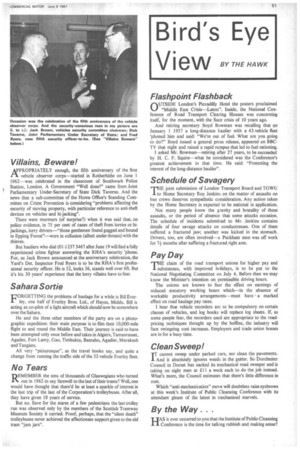Bird's Eye
Page 53

If you've noticed an error in this article please click here to report it so we can fix it.
View BY THE HAWK
Villains, Beware!
APROPRIATELY enough, the fifth anniversary of the first vehicle observer corps—started in Rotherhithe on June 1 1962—was celebrated in the classroom of Southwark Police Station, London. A Government "Well done!" came from Joint Parliamentary Under-Secretary of State Dick Taverne. And the news that a sub-committee of the Home Office's Standing Committee on Crime Prevention is considering "problems affecting the security of moving property, with particular reference to anti-theft devices on vehicles and hi-jacking".
There were murmurs (of surprise?) when it was said that, on police evidence, in 75 per cent of cases of theft from lorries or hijackings, lorry drivers—"those gentlemen found gagged and bound in Epping Forest"—were in collusion (albeit under threats) with the thieves.
But hauliers who dial (01-) 237 3467 after June 19 will find a fully experienced crime fighter answering the RHA's security 'phone. For, as Jack Brown announced at the anniversary celebration, the Yard's Det. Inspector Fred Byers is to be the RHA's first professional security officer. He is 52, looks 36, stands well over 6ft. But it's his 30 years' experience that the lorry villains have to fear.
Sahara Sortie
UORGETTING the problems of haulage for a while is Bill Everley, one half of Everley Bros. Ltd., of Hayes, Middx. Bill is acting as co-pilot of a light aircraft which should now be somewhere over the Sahara.
He and the three other members of the party are on a photographic expedition: their main purpose is to film their 10,000-mile flight to and round the Middle East. Their journey is said to have been attempted only once before and takes in Algiers, Tamanrasset, Agades, Fort Lamy, Gao, Timbuktu, Bamaho, Agadier, Marakesh and Tangiers.
All very "picturesque", as the travel books say, and quite a change from running the traffic side of the 32-vehicle Everley fleet.
No Tears
DEMEMBER the tens of thousands of Glaswegians who turned -1-Nout in 1962 to say farewell to the last of their trams? Well, one would have thought that there'd be at least a sparkle of interest in the last trip of the last of the Corporation's trolleybuses. After all, they have given 18 years of service.
But no. Save for the stares of a few pedestrians the last trolley run was observed only by the members of the Scottish Tramway Museum Society it carried. Proof, perhaps, that the "silent death" trolleybuses never achieved the affectionate support given to the old tram "jam jars".
Flashpoint Flashback
OUTSIDE London's Piccadilly Hotel the posters proclaimed "Middle East Crisis—Latest". Inside, the National Conference of Road Transport Clearing Houses was concerning itself, for the moment, with the Suez crisis of 10 years ago.
And retiring secretary Boyd Bowman was recalling that on January 1 1957 a long-distance haulier with a 43-vehicle fleet 'phoned him and said: "We're out of fuel. What are you going to do?" Boyd issued a general press release, appeared on BBCTV that night and raised a rapid rumpus that led to fuel rationing.
I asked Mr. Bowman—retiring after 27 years, to be succeeded by H. C. F. Squire—what he considered was the Conference's greatest achievement in that time. He said: "Protecting the interest of the long-distance haulier".
Schedule of Savagery
TE joint submission of London Transport Board and TGWU , Home Secretary Roy Jenkins on the matter of assaults on bus crews deserves sympathetic consideration. Any action taken by the Home Secretary is expected to be national in application.
Not many people know the gravity and brutality of these assaults, or the period of absence that some attacks occasion. The schedule of incidents submitted to Mr. Jenkins contains details of four savage attacks on conductresses. One of them suffered a fractured jaw; another was kicked in the stomach. Drivers, too, are often involved—a Peckham men was off work for 7+ months after suffering a fractured right arm.
Pay Day
E claim of the road transport unions for higher pay and subsistence, with improved holidays, is to be put to the National Negotiating Committee on July 6. Before then we may know the Minister's intention on permissible driving hours. The unions are known to fear the effect on earnings of reduced statutory working hours which—in the absence of workable productivity arrangements must have a marked effect on road haulage pay rates.
I hear that vehicle recorders are to be compulsory on certain classes of vehicles, and log books will replace log sheets. If, as some people fear, the recorders used are appropriate to the roadpricing techniques thought up by the boffins, the industry will face swingeing cost increases. Employers and trade union bosses are in for a busy time.
Clean Sweep!
TT cannot sweep under parked cars, nor clean the pavements. 1_ And it absolutely ignores weeds in the gutter. So Dorchester Council in Dorset has sacked its mechanical road sweeper and is taking on eight men at ill a week each to do the job instead. What's more, the Council estimates that there's little difference in cost.
Which "anti-mechanization" move will doubtless raise eyebrows at this week's Institute of Public Cleansing Conference with its attendant gleam of the latest in mechanized marvels_
By the Way.. .
HAS it ever occurred to you that the Institute of Public Cleansing Conference is the time for talking rubbish and making sense?




























































































































